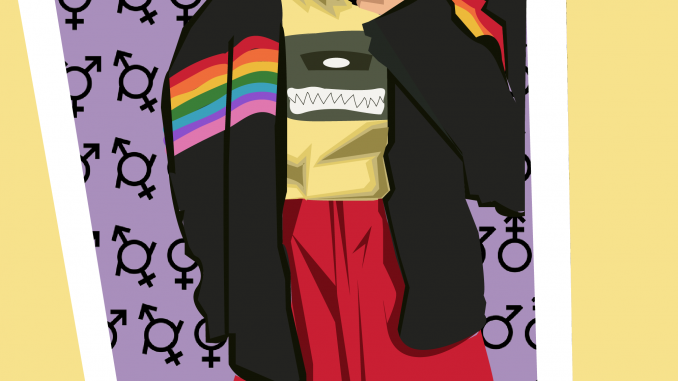
Some Temple University students are opting for gender-fluid wardrobes to defy stereotypes and allow room for self-expression.
Most clothing lines are tailored to a gender binary. But this is changing on campus and across the country. A November 2018 GQ article declared that “gender fluid fashion is the future.” Brands like GFW Clothing, an English gender-marker free line, have begun to market clothing for the body rather than gender.
Olivia Potter, a freshman graphic and interactive design major, said her androgynous style was judged in her hometown of Lancaster, Pennsylvania, but more accepted on Main Campus.
“Sometimes, I would feel insecure for not being feminine enough for how I dress,” Potter added. “For women, that’s an expectation. But being in Philadelphia, I feel like there’s less pressure to be that way, but in the suburbs, there’s more of an expectation.”
Potter wears clothes that showcase her personality rather than what groups to which she might identify with, like her gender, sexuality or political affiliation.
“I like being different,” Potter said. “[Fashion] is a way to make me individual to myself rather than grouped together.”
Carmen Beadie, a freshman theater major, said they’ve noticed pressure in the gender nonconforming community to wear androgynous clothing. Beadie identifies as nonbinary and shops in both the women’s and men’s sections of clothing stores.
“I definitely am a bit nervous about dressing feminine because then people will think they can use she/her pronouns,” Beadie said. “That’s definitely a struggle I’ve noticed in the gender nonconforming community.”
“Fashion is gendered but it shouldn’t be,” Beadie added.
Dustin Kidd, a sociology professor at Temple, said the definition of gender can be influenced by the structures of different societal institutions.
“Fashion is one of those institutions,” Kidd said. “Fashion tells women they can be better women and men that they can be more manly or demonstrate wealth and power.”
The fashion industry often “doubles down” on gender binaries to sell products, he added. That means clothing is targeted toward men or women, not people who identify as nonbinary, to profit.
“Fashion is committed to ideas about gender that makes us want to buy more things,” Kidd said.
Thatcher Williams, a junior public relations major, also shops in both men’s and women’s sections of stores and prioritizes self-expression over conforming to rigid expectations for gender and sexuality.
Williams became interested in fashion at a young age and drew inspiration from feminine styles in shows like “Sailor Moon.”
“I’ve always been very interested in femininity and how fashion is so integral to expressing yourself,” he said. “Your gender does not mean you have to dress a certain way.”
For Autumn Wallace, a 2018 painting and ceramics alumna, fashion is a tool to gain confidence in social environments. Her outfits are theatrical personas that help her act extroverted despite being introverted, she said. Sometimes, she will wear sequined pants or pair a gray wig with a ruffled Victorian shirt.
Wallace does not deliberately reference gender with her clothing, but she likes to wear outfits that people may not expect her to wear. As a person of color, she challenges these expectations by thinking about how she can defy media stereotypes in environments where there are no other people of color around, she said.
“A lot of times, people will have assumptions,” Wallace said. “Just putting on the outfit of the area without fitting into the look of the area or what people are used to [makes a statement]. Race and gender really are interesting things to play with.”



I thoroughly enjoyed this article. It is great to see that other students understand this struggle with fashion. Oftentimes, it feels really lonely in a world where women must dress like women and men like men. It leaves no room for self-expression nor individualism. Thank you for this article.